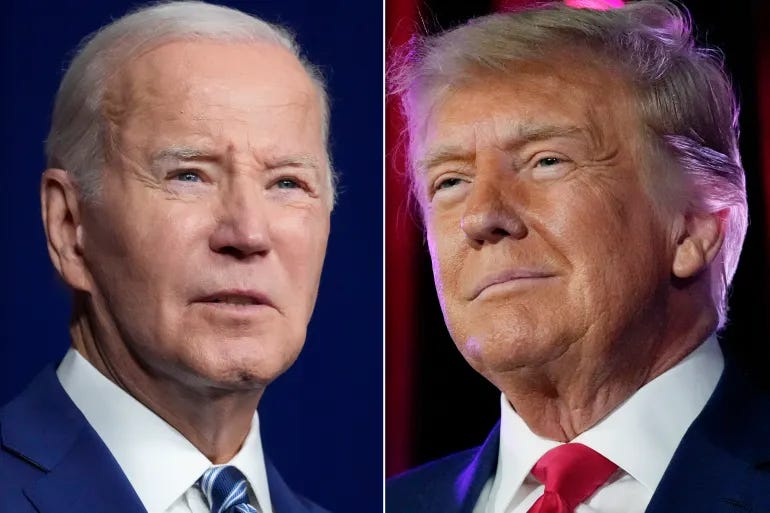Biden's Role in Israel-Hamas Ceasefire Deal Overpowered by Trump’s Presence
As Biden seeks a foreign policy win in his final days, his political rival Trump steals the spotlight.
Before President Joe Biden had even announced the Israel-Hamas ceasefire agreement, his attempt to secure a foreign policy victory in the final days of his administration was overshadowed by none other than Donald Trump.
Trump, who is set to be inaugurated as the 47th U.S. president next week, took to his Truth Social platform to announce the ceasefire hours before Biden confirmed the deal in a statement from the White House on Wednesday evening.
“This EPIC ceasefire agreement could have only happened as a result of our Historic Victory in November, signaling to the entire world that my Administration would seek Peace and negotiate deals to ensure the safety of all Americans and our Allies,” Trump claimed, quickly taking credit for the breakthrough following 15 months of conflict.
Biden, speaking later from the White House, reiterated that his administration had "never ceased" working on the issue but acknowledged that it had worked with Trump’s team to ensure the U.S. spoke with "one voice." Trump had dispatched his incoming Middle East envoy, Steve Witkoff, to Qatar to participate in the negotiations for the ceasefire.
While Biden stressed that the deal was "developed and negotiated by my team," he appeared perplexed by suggestions that credit could be given elsewhere. When asked who deserved the credit, Biden simply responded: "Is that a joke?"
Bluster or Influence?
Although Trump is known for his penchant for bravado, his involvement in the ceasefire talks has been widely acknowledged, even by those outside his core supporters. Mike Casey, a former U.S. State Department official who resigned due to Biden’s stance on the war, speculated that Israel might have timed the deal to benefit Trump politically. “There’s domestic political considerations for Netanyahu, and it’s essentially not that much different than the deal they could have agreed to in May,” Casey remarked.
In Israel, media reports have gone further, with some suggesting that Trump's involvement directly influenced Prime Minister Netanyahu's decision to agree to the deal. The Times of Israel reported that a single round of negotiations with Trump’s envoy, Witkoff, may have swayed Netanyahu more effectively than Biden's efforts throughout the year.
Biden officials privately acknowledged Witkoff’s significant role, with one official mentioning that his collaboration with Biden’s negotiator Brett McGurk proved "quite effective."
Trump’s Influence on Netanyahu?
Experts also speculated that Trump’s team may have exerted pressure on Netanyahu to seal the deal. Jean-Loup Samaan, a senior fellow at the Middle East Institute, stated that Trump had been clear about not wanting the war to drag on until his return to office, adding that publicizing the pressures exerted by the Trump team could help Netanyahu with his right-wing coalition partners.
Samaan suggested that Netanyahu might use this as a way to signal to his far-right partners, such as Bezalel Smotrich and Itamar Ben-Gvir, that he had to make concessions to Trump to secure the ceasefire.
Alam Saleh, an expert on Middle Eastern politics at the Australian National University, acknowledged that Trump’s envoy might have played a role but cautioned that the influence could be overstated. "It’s possible that Netanyahu could have been swayed by Witkoff’s position or the dynamics of the meeting," he said, adding that the timing of the ceasefire could be designed to present Trump’s team as more effective on Middle East peace issues.
A Legacy of Overlooked Efforts?
For Biden, the overshadowing of his role in the ceasefire mirrors the situation faced by former President Jimmy Carter. In the final days of his administration, Carter worked with Ronald Reagan’s incoming team to secure the release of 52 Americans held captive in Iran, a crisis that had plagued his presidency. The hostages were released just moments after Reagan’s inauguration, providing the new administration with a political victory that Biden’s efforts have not been able to claim in the Israel-Hamas ceasefire deal.


